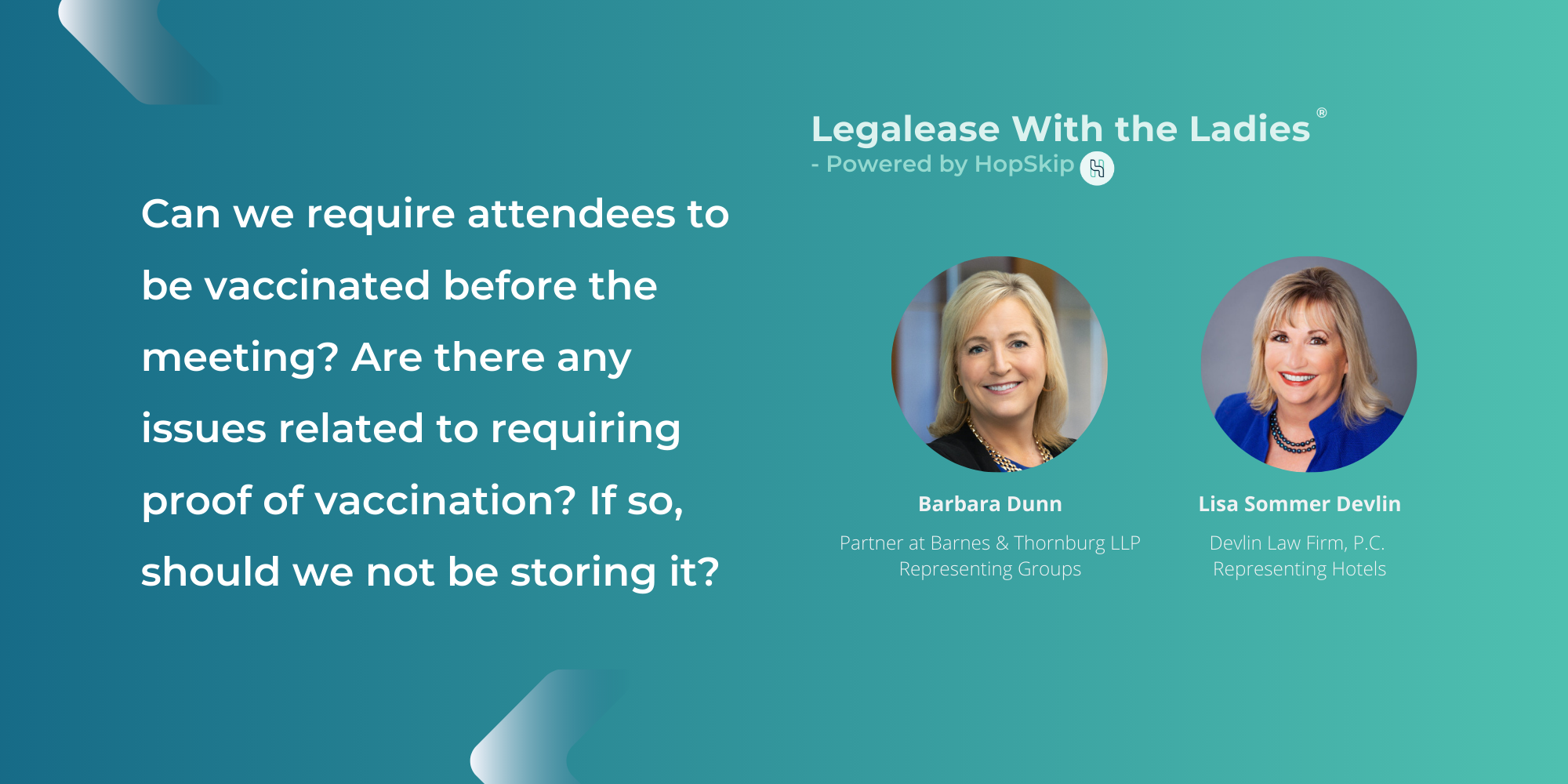Can we require attendees to be vaccinated before the meeting?
Part 1 of a series of posts where we will be sharing transcripts from HopSkip's "Looking Forward" webinar featuring Legalease With the Ladies.

This is Part 1 of a series of posts where we will be sharing transcripts from our "Looking Forward" webinar featuring Legalease With the Ladies.
The information provided on this website does not, and is not intended to, constitute legal advice; instead, all information, content, and materials available on this site are for general informational purposes only. Information on this website may not constitute the most up-to-date legal or other information. This website contains links to other third-party websites. Such links are only for the convenience of the reader, user or browser; HopSkip, its blog authors and contributors do not recommend or endorse the contents of the third-party sites.
Readers of this website should contact their attorney to obtain advice with respect to any particular legal matter.
Can we require attendees to be vaccinated before the meeting? Are there any issues related to requiring proof of vaccination? If so, should we not be storing it?
Barbara Dunn: The short answer is yes. The longer answer is…..you have to think it all the way through. So yes, a group could require vaccines to have folks attend the meetings.
However, there are two notable exemptions which apply both in an employment context as well as in a public accommodation’s context. That would be if someone had a medical condition which prohibited them from getting the vaccine or a sincerely held religious belief that would prevent them from getting the vaccine. Absent those circumstances, those are really the main exceptions that a group could make.
Now, from a practical standpoint this year or until there's a large portion of the population that can get vaccinated, we're going to have a business issue in requiring vaccines in the short term. If you did require vaccines, you're just likely to have less folks that are able to qualify, so that is something to think about as well.
In terms of any kind of health information, if you collect it, you've got to protect it, meaning that you have to store that data somewhere. And although a group wouldn't be a health care provider per say, subject to the requirements of HIPAA, there are a number of other laws that would apply, including the Americans with Disabilities Act, as well as the Genetic Information Act. So, it's really important to make sure you understand what's to be collected. Lots of discussion about a vaccine passport and alike in terms of proof that I'm sure that will evolve as this comes true.
But you know, Lisa and I were chatting the other day, and Lisa made a great point. Which is, you know when you ask for someone’s ID if you're going to serve liquor, you will look at the ID to make sure they are 21 or up and then you’re you serve the liquor. You don't take a copy of the license. Similarly, we may look at that for the vaccines in terms of checking it off the list, but not necessarily asking to retain a copy. Because of the information that's on there, but if you have that information, again, you have to protect it.
So, I think going forward, a vaccine policy is a reasonable outcome. Don't forget also, that we're not just talking about the attendees at the event, we’re also talking about the hotels and the venues. I mean, there's a big push obviously to get our hospitality folks vaccinated, and that might lag what a group's vaccination policy is. So, you really need to look at it overall, and we can talk more about other practical ways to manage risk at the conferences. But Lisa, I know from the hotel's perspective you have talked about a little bit on what the vaccine requirements could look like on both sides, and certainly from the employment context.
Lisa Sommer Devlin: From the employment side, you know that is an issue going forward that they are going to be in a position to make a decision about whether or not they will require it. And to Barbara's point, maybe you just want to see proof of vaccine and not keep records might be important.
The other issue that's out there, that's very amorphous and that is going to be difficult for everybody to deal with, aside from those religious beliefs or health beliefs, there's a substantial portion of our population that for whatever reason, doesn't want to take the vaccine. And if your organization is making the decision that you're going to require vaccines, you’re going to have to decide how you're going to handle that portion of your attendance. And I don't have an answer for you. I think it's going to be a tough call. You may decide from a health standpoint that you're going to make it a requirement. I wouldn't disagree with you. But in doing that, you need to consider the fact that they may negatively impact your attendance.
This post is a multi part series where we will be sharing the questions and answers that were originally generated from HopSkip's recent "Looking Forward Webinar" featuring Legalease With the Ladies. You can download the recorded webinar here.